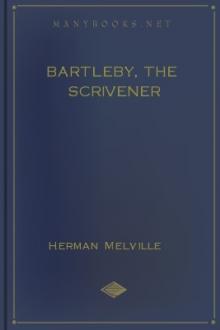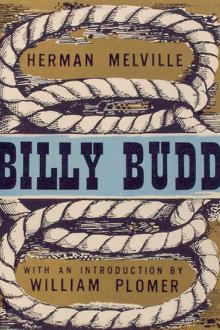Bartleby, The Scrivener - Herman Melville (best finance books of all time .TXT) 📗

- Author: Herman Melville
- Performer: -
Book online «Bartleby, The Scrivener - Herman Melville (best finance books of all time .TXT) 📗». Author Herman Melville
Though concerning the self-indulgent habits of Turkey I had my own private surmises, yet touching Nippers I was well persuaded that whatever might be his faults in other respects, he was, at least, a temperate young man. But indeed, nature herself seemed to have been his vintner, and at his birth charged him so thoroughly with an irritable, brandy-like disposition, that all subsequent potations were needless. When I consider how, amid the stillness of my chambers, Nippers would sometimes impatiently rise from his seat, and stooping over his table, spread his arms wide apart, seize the whole desk, and move it, and jerk it, with a grim, grinding motion on the floor, as if the table were a perverse voluntary agent, intent on thwarting and vexing him; I plainly perceive that for Nippers, brandy and water were altogether superfluous.
It was fortunate for me that, owing to its peculiar cause—indigestion—the irritability and consequent nervousness of Nippers, were mainly observable in the morning, while in the afternoon he was comparatively mild. So that Turkey's paroxysms only coming on about twelve o'clock, I never had to do with their eccentricities at one time. Their fits relieved each other like guards. When Nippers' was on, Turkey's was off; and vice versa. This was a good natural arrangement under the circumstances.
Ginger Nut, the third on my list, was a lad some twelve years old. His father was a carman, ambitious of seeing his son on the bench instead of a cart, before he died. So he sent him to my office as student at law, errand boy, and cleaner and sweeper, at the rate of one dollar a week. He had a little desk to himself, but he did not use it much. Upon inspection, the drawer exhibited a great array of the shells of various sorts of nuts. Indeed, to this quick-witted youth the whole noble science of the law was contained in a nut-shell. Not the least among the employments of Ginger Nut, as well as one which he discharged with the most alacrity, was his duty as cake and apple purveyor for Turkey and Nippers. Copying law papers being proverbially dry, husky sort of business, my two scriveners were fain to moisten their mouths very often with Spitzenbergs to be had at the numerous stalls nigh the Custom House and Post Office. Also, they sent Ginger Nut very frequently for that peculiar cake—small, flat, round, and very spicy—after which he had been named by them. Of a cold morning when business was but dull, Turkey would gobble up scores of these cakes, as if they were mere wafers—indeed they sell them at the rate of six or eight for a penny—the scrape of his pen blending with the crunching of the crisp particles in his mouth. Of all the fiery afternoon blunders and flurried rashnesses of Turkey, was his once moistening a ginger-cake between his lips, and clapping it on to a mortgage for a seal. I came within an ace of dismissing him then. But he mollified me by making an oriental bow, and saying—"With submission, sir, it was generous of me to find you in stationery on my own account."
Now my original business—that of a conveyancer and title hunter, and drawer-up of recondite documents of all sorts—was considerably increased by receiving the master's office. There was now great work for scriveners. Not only must I push the clerks already with me, but I must have additional help. In answer to my advertisement, a motionless young man one morning, stood upon my office threshold, the door being open, for it was summer. I can see that figure now—pallidly neat, pitiably respectable, incurably forlorn! It was Bartleby.
After a few words touching his qualifications, I engaged him, glad to have among my corps of copyists a man of so singularly sedate an aspect, which I thought might operate beneficially upon the flighty temper of Turkey, and the fiery one of Nippers.
I should have stated before that ground glass folding-doors divided my premises into two parts, one of which was occupied by my scriveners, the other by myself. According to my humor I threw open these doors, or closed them. I resolved to assign Bartleby a corner by the folding-doors, but on my side of them, so as to have this quiet man within easy call, in case any trifling thing was to be done. I placed his desk close up to a small side-window in that part of the room, a window which originally had afforded a lateral view of certain grimy back-yards and bricks, but which, owing to subsequent erections, commanded at present no view at all, though it gave some light. Within three feet of the panes was a wall, and the light came down from far above, between two lofty buildings, as from a very small opening in a dome. Still further to a satisfactory arrangement, I procured a high green folding screen, which might entirely isolate Bartleby from my sight, though not remove him from my voice. And thus, in a manner, privacy and society were conjoined.
At first Bartleby did an extraordinary quantity of writing. As if long famishing for something to copy, he seemed to gorge himself on my documents. There was no pause for digestion. He ran a day and night line, copying by sun-light and by candle-light. I should have been quite delighted with his application, had he been cheerfully industrious. But he wrote on silently, palely, mechanically.
It is, of course, an indispensable part of a scrivener's business to verify the accuracy of his copy, word by word. Where there are two or more scriveners in an office, they assist each other in this examination, one reading from the copy, the other holding the original. It is a very dull, wearisome, and lethargic affair. I can readily imagine that to some sanguine temperaments it would be altogether intolerable. For example, I cannot credit that the mettlesome poet Byron would have contentedly sat down with Bartleby to examine a law document of, say five hundred pages, closely written in a crimpy hand.
Now and then, in the haste of business, it had been my habit to assist in comparing some brief document myself, calling Turkey or Nippers for this purpose. One object I had in placing Bartleby so handy to me behind the screen, was to avail myself of his services on such trivial occasions. It was on the third day, I think, of his being with me, and before any necessity had arisen for having his own writing examined, that, being much hurried to complete a small affair I had in hand, I abruptly called to Bartleby. In my haste and natural expectancy of instant compliance, I sat with my head bent over the original on my desk, and my right hand sideways, and somewhat nervously extended with the copy, so that immediately upon emerging from his retreat, Bartleby might snatch it and proceed to business without the least delay.
In this very attitude did I sit when I called to him, rapidly stating what it was I wanted him to do—namely, to examine a small paper with me. Imagine my surprise, nay, my consternation, when without moving from his privacy, Bartleby in a singularly mild, firm voice, replied, "I would prefer not to."
I sat awhile in perfect silence, rallying my stunned faculties. Immediately it occurred to me that my ears had deceived me, or Bartleby had entirely misunderstood my meaning. I repeated my request in the clearest tone I could assume. But in quite as clear a one came the previous reply, "I would prefer not to."
"Prefer not to," echoed I, rising in high excitement, and crossing the room with a stride. "What do you mean? Are you moon-struck? I want you to help me compare this sheet here—take it," and I thrust it towards him.
"I would prefer not to," said he.
I looked at him steadfastly. His face was leanly composed; his gray eye dimly calm. Not a wrinkle of agitation rippled him. Had there been the least uneasiness, anger, impatience or impertinence in his manner; in other words, had there been any thing ordinarily human about him, doubtless I should have violently dismissed him from the premises. But as it was, I should have as soon thought of turning my pale plaster-of-paris bust of Cicero out of doors. I stood gazing at him awhile, as he went on with his own writing, and then reseated myself at my desk. This is very strange, thought I. What had one best do? But my business hurried me. I concluded to forget the matter for the present, reserving it for my future leisure. So calling Nippers from the other room, the paper was speedily examined.
A few days after this, Bartleby concluded four lengthy documents, being quadruplicates of a week's testimony taken before me in my High Court of Chancery. It became necessary to examine them. It was an important suit, and great accuracy was imperative. Having all things arranged I called Turkey, Nippers and Ginger Nut from the next room, meaning to place the four copies in the hands of my four clerks, while I should read from the original. Accordingly Turkey, Nippers and Ginger Nut had taken their seats in a row, each with his document in hand, when I called to Bartleby to join this interesting group.
"Bartleby! quick, I am waiting."
I heard a slow scrape of his chair legs on the uncarpeted floor, and soon he appeared standing at the entrance of his hermitage.
"What is wanted?" said he mildly.
"The copies, the copies," said I hurriedly. "We are going to examine them. There"—and I held towards him the fourth quadruplicate.
"I would prefer not to," he said, and gently disappeared behind the screen.
For a few moments I was turned into a pillar of salt, standing at the head of my seated column of clerks. Recovering myself, I advanced towards the screen, and demanded the reason for such extraordinary conduct.
"Why do you refuse?"
"I would prefer not to."
With any other man I should have flown outright into a dreadful passion, scorned all further words, and thrust him ignominiously from my presence. But there was something about Bartleby that not only strangely disarmed me, but in a wonderful manner touched and disconcerted me. I began to reason with him.
"These are your own copies we are about to examine. It is labor saving to you, because one examination will answer for your four papers. It is common usage. Every copyist is bound to help examine his copy. Is it not so? Will you not speak? Answer!"
"I prefer not to," he replied in a flute-like tone. It seemed to me that while I had been addressing him, he carefully revolved every statement that I made; fully comprehended the meaning; could not gainsay the irresistible conclusions; but, at the same time, some paramount consideration prevailed with him





Comments (0)